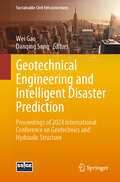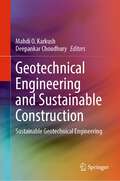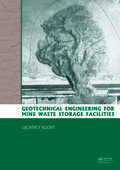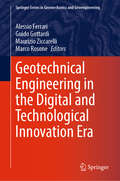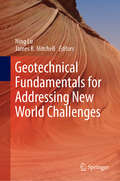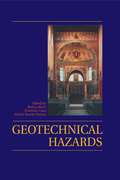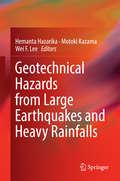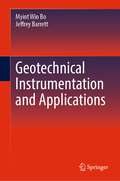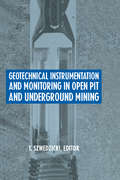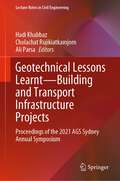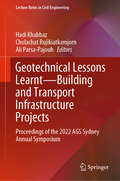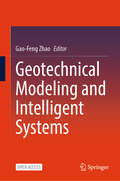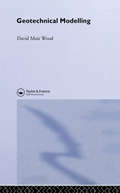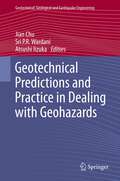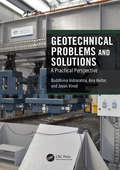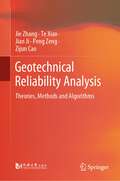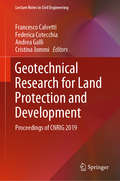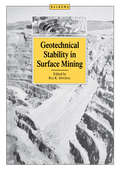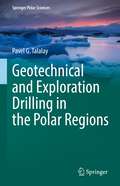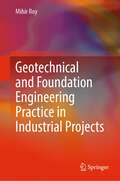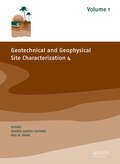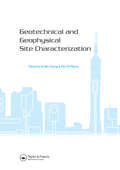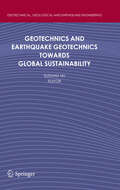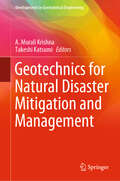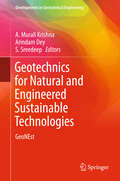- Table View
- List View
Geotechnical Engineering and Intelligent Disaster Prediction: Proceedings of 2024 International Conference on Geotechnics and Hydraulic Structure (Sustainable Civil Infrastructures)
by Wei Gao Danqing SongThis book features selected proceedings from the "2024 International Conference on Geotechnics and Hydraulic Structure," focusing on Geotechnical Engineering and Intelligent Disaster Prediction. It addresses the vital role of geotechnical engineering in underground structure safety and infrastructure stability. With the advancement of AI and interdisciplinary collaboration, the field has transitioned to electronic surveying and big data prediction for stress analysis and safety monitoring. The conference highlights stress analysis in geotechnical and underground engineering, and the application of AI in geotechnical predictions. The book includes case studies and research on soil mechanics, tunnel construction, and geotechnical failures, as well as AI's role in disaster prediction and monitoring. It aims to be a comprehensive resource for engineers and scholars, offering insights and innovative solutions in geotechnical engineering.
Geotechnical Engineering and Sustainable Construction: Sustainable Geotechnical Engineering
by Deepankar Choudhury Mahdi O. KarkushThis book contains selected articles from the Second International Conference on Geotechnical Engineering-Iraq (ICGE-Iraq) held in Akre/Duhok/Iraq from June 22 to 23, 2021, to discuss the challenges, opportunities, and problems of geotechnical engineering in projects. Also, the conference includes modern applications in structural engineering, materials of construction, construction management, planning and design of structures, and remote sensing and surveying engineering. The ICGE-Iraq organized by the Iraqi Scientific Society of Soil Mechanics and Foundation Engineering (ISSSMFE) in cooperation with Akre Technical Institute / Duhok Polytechnic University, College of Engineering /University of Baghdad, and Civil Engineering Department/University of Technology. The book covers a wide spectrum of themes in civil engineering, including but not limited to sustainability and environmental-friendly applications. The contributing authors are academic and researchers in their respective fields from several countries. This book will provide a valuable resource for practicing engineers and researchers in the field of geotechnical engineering, structural engineering, and construction and management of projects.
Geotechnical Engineering for Mine Waste Storage Facilities
by Geoffrey E. BlightThe book is a comprehensive treatment of the application of geotechnical engineering to site selection, site exploration, design, operation and closure of mine waste storage facilities.The level and content are suitable as a technical source and reference for practising engineers engaged both in the design and operational management of mine waste s
Geotechnical Engineering in the Digital and Technological Innovation Era (Springer Series in Geomechanics and Geoengineering)
by Alessio Ferrari Guido Gottardi Marco Rosone Maurizio ZiccarelliThe book collects the keynote contributions and the papers presented at the “8th Italian Conference of Researchers in Geotechnical Engineering 2023, CNRIG’23”. The conference was held on July 5–7, 2023, at the University of Palermo (Italy), and it was organized under the auspices of the National Group of Geotechnical Engineering (GNIG). The event has been organized to promote interaction among geotechnical engineering and applied sciences, with special focus on technological and digital innovations. The book covers a wide range of classical and emerging topics in geotechnics, including innovation in laboratory testing and in situ monitoring, thermo-hydro-chemo-mechanical behavior of geo-materials, computational geomechanics, analyses of instability processes in seismic conditions, probabilistic approaches, resilience of critical infrastructures and advances in risk mitigation strategies, and eco-friendly solutions for soils and rocks stabilization. This book is intended for postgraduate students, researchers, and practitioners working on geotechnical engineering and related areas.
Geotechnical Fundamentals for Addressing New World Challenges (Springer Series in Geomechanics and Geoengineering)
by Ning Lu James K. MitchellThis single-volume thoroughly summarizes advances in the past several decades and emerging challenges in fundamental research in geotechnical engineering. These fundamental research frontiers are critically reviewed and described in details in lights of four grand challenges our society faces: climate adaptation, urban sustainability, energy and material resources, and global water resources. The specific areas critically reviewed, carefully examined, and envisioned are: sensing and measurement, soil properties and their physics roots, multiscale and multiphysics processes in soil, geochemical processes for resilient and sustainable geosystems, biological processes in geotechnics, unsaturated soil mechanics, coupled flow processes in soil, thermal processes in geotechnical engineering, and rock mechanics in the 21st century.
Geotechnical Hazards
by Božica MarićThe contributions to this volume examine: geotechnical hazard acknowledging the deversity of local ground conditions and environmental factors which play a decisive role in designing engineering structures in Danubian countries.
Geotechnical Hazards from Large Earthquakes and Heavy Rainfalls
by Hemanta Hazarika Motoki Kazama Wei F. LeeThis book is a collection of papers presented at the International Workshop on Geotechnical Natural Hazards held July 12-15, 2014, in Kitakyushu, Japan. The workshop was the sixth in the series of Japan-Taiwan Joint Workshops on Geotechnical Hazards from Large Earthquakes and Heavy Rainfalls, held under the auspices of the Asian Technical Committee No. 3 on Geotechnology for Natural Hazards of the International Society for Soil Mechanics and Geotechnical Engineering. It was co-organized by the Japanese Geotechnical Society and the Taiwanese Geotechnical Society. The contents of this book focus on geotechnical and natural hazard-related issues in Asia such as earthquakes, tsunami, rainfall-induced debris flows, slope failures, and landslides. The book contains the latest information and mitigation technology on earthquake- and rainfall-induced geotechnical natural hazards. By dissemination of the latest state-of-the-art research in the area, the information contained in this book will help researchers, designers, consultants, government officials, and academicians involved in the mitigation of natural hazards. The findings and other information provided here is expected to contribute toward the development of a new chapter in disaster prevention and mitigation of geotechnical structures.
Geotechnical Instrumentation and Applications
by Myint Win Bo Jeffrey BarrettGeotechnical Instrumentation and Applications explains the geotechnical issues encountered in the implementation of construction projects dealing with ground, groundwater, and earth infrastructures, including land reclamations, dams, embankments, landfill construction, excavations, and tunnelling. The book describes the types of geotechnical instrumentation available in the market and walks readers through the geotechnical issues usually encountered in construction projects and observational methods applying geotechnical instruments, planning, and implementation of geotechnical instrumentation projects. Detailed coverage of the calibration and installation process of geotechnical instruments, the verification of measured data, and the recording and documentation of as-built drawings of geotechnical instruments installed are presented. Coverage also includes methods of measurement, recommended monitoring frequencies for manual monitoring and methods of data processing and presentation, as well as analyses and interpretations of monitored data for performance assessment. Factors affecting measured instrument data are also discussed with a few examples. Case studies are presented with field data collected during the implementation of large-scale ground improvements and ground engineering projects involving extensive geotechnical instrumentation works. The book will be an ideal text for upper-undergraduate and graduate geotechnical engineering, foundation engineering, and soil mechanics courses and a hands-on reference for practitioners who apply geotechnical instrumentation in the construction industry.
Geotechnical Instrumentation and Monitoring in Open Pit and Underground Mining
by T. SzwedzickiAs mining operations increase in scale and mines go progressively deeper, the geotechnical input into mine design is of importance. This book covers topics in geotechnical instrumentation and monitoring, including coverage of groundwater, displacement and environmental monitoring.
Geotechnical Lessons Learnt—Building and Transport Infrastructure Projects: Proceedings of the 2021 AGS Sydney Annual Symposium (Lecture Notes in Civil Engineering #325)
by Hadi Khabbaz Cholachat Rujikiatkamjorn Ali ParsaThis book contains accepted papers submitted and peer-reviewed for the 25th Annual Symposium organised by the Sydney Chapter of the Australian Geomechanics Society (AGS). The objective is to bring together the key stakeholders of the Australian geological and geotechnical community. It showcases state-of-the-art practices, new research findings, and case histories that demonstrate geotechnical advances and challenges in building and transport infrastructure. It focuses on geotechnical aspects of smart solutions and improvements in geotechnical approaches for transport infrastructure projects, advances in tunnel design and construction, and geotechnical challenges in design and construction – case histories and lessons learnt. This volume will be a useful guide to those in academia and industry working in the fields of geotechnical engineering.
Geotechnical Lessons Learnt—Building and Transport Infrastructure Projects: Proceedings of the 2022 AGS Sydney Annual Symposium (Lecture Notes in Civil Engineering #541)
by Hadi Khabbaz Cholachat Rujikiatkamjorn Ali Parsa-PajouhThis book presents the select proceedings of the 26th Annual Symposium organized by the Sydney Chapter of the Australian Geomechanics Society (AGS). The symposium brought together key stakeholders of the Australian geological and geotechnical community. This book showcases state-of-the-art practices, new research findings, and case histories that demonstrate reliability-based designs and assessments. The papers on reliability-based approaches cover various aspects of site investigations, interpretations, designs, specialized testing, and technologies. This book presents recent innovations, trends, and concerns, as well as practical challenges encountered, and solutions adopted in the field. This volume will be a useful guide to those in academia and industry working in the fields of geotechnical engineering.
Geotechnical Modeling and Intelligent Systems
by Gao-Feng ZhaoThis open access book provides insights into research topics related to geotechnical engineering simulations. With the development of computing power and artificial intelligence, research methods in geotechnical engineering are gradually shifting from field surveys and physical experiments toward simulation and prediction. Through simulations, it is possible to infer the impact of engineering structures on soil and rock masses, as well as their response to natural disasters such as earthquakes, landslides, and debris flows, allowing for early planning of mitigation measures. Inside, readers will find cutting-edge studies on microbial soil stabilization, finite element simulations, centrifuge modeling, and machine learning applications. Topics include advanced material characterization, predictive modeling of tunnels and slopes, AI-enhanced monitoring systems, and risk mitigation strategies for deep excavations and mining subsidence. These contributions illustrate how intelligent systems are optimizing both design and safety across a wide range of geotechnical scenarios. This volume is an essential resource for researchers, engineers, and graduate students seeking to leverage intelligent technologies for more efficient, accurate, and resilient geotechnical solutions. With its integration of theory, experimentation, and smart modeling, it offers a forward-looking perspective on the future of infrastructure in a rapidly evolving technological landscape.
Geotechnical Modelling
by David Muir Wood<p>Modelling forms an implicit part of all engineering design but many engineers engage in modelling without consciously considering the nature, validity and consequences of the supporting assumptions. Derived from courses given to postgraduate and final year undergraduate MEng students, this book presents some of the models that form a part of the typical undergraduate geotechnical curriculum and describes some of the aspects of soil behaviour which contribute to the challenge of geotechnical modelling. <p>Assuming a familiarity with basic soil mechanics and traditional methods of geotechnical design, this book is a valuable tool for students of geotechnical and structural and civil engineering as well as also being useful to practising engineers involved in the specification of numerical or physical geotechnical modelling.</p>
Geotechnical Predictions and Practice in Dealing with Geohazards
by Atsushi Iizuka Jian Chu Sri P.R. WardaniThe recent earthquake disasters in Japan and a series of other disasters in the world have highlighted again the need for more reliable geotechnical prediction and better methods for geotechnical design and in particular dealing with geohazards. This book provides a timely review and summaries of the recent advances in theories, analyses and methods for geotechnical predictions and the most up-to-date practices in geotechnical engineering and particularly in dealing with geohazards. A special section on the geotechnical aspects of the recent Tohoku earthquake disaster in Japan is also presented in this book. Key Features: This book is written by a group of internationally renowned researchers and practioners to honour and mark the 40 years' contribution of one of the greatest educators, researchers and engineers in the world, Professor Hideki Ohta, to geotechnical engineering. Professor Ohta is presently professor at Chou University after his retirement from Tokyo Institute of Technology, Japan. The book provides some first-hand information on the 2011 Tohuko earthquake disasters in Japan, the most recent update on the theories and methods for geotechnical analyses and predictions, and the latest methods and practices in geotechnical engineering, in particular, dealing with geotechnical hazard. It is a rare occasion for some 30 plus international authorities to write on their best topic that they have been working on for years. The book is a must-have collection for any libraries and professionals in geotechnical engineering.
Geotechnical Problems and Solutions: A Practical Perspective
by Buddhima Indraratna Ana Heitor Jayan S. VinodThis book covers problems and their solution of a wide range of geotechnical topics. Every chapter starts with a summary of key concepts and theory, followed by worked-out examples, and ends with a short list of key references. It presents a unique collection of step by step solutions from basic to more complex problems in various topics of geotechnical engineering, including fundamental topics such as effective stress, permeability, elastic deformation, shear strength and critical state together with more applied topics such retaining structures and dams, excavation and tunnels, pavement infrastructure, unsaturated soil mechanics, marine works, ground monitoring. This book aims to provide students (undergraduates and postgraduates) and practitioners alike a reference guide on how to solve typical geotechnical problems. Features: Guide for solving typical geotechnical problems complementing geotechnical textbooks. Reference guide for practitioners to assist in determining solutions to complex geotechnical problems via simple methods.
Geotechnical Reliability Analysis: Theories, Methods and Algorithms
by Jie Zhang Zijun Cao Peng Zeng Te Xiao Jian JiThis textbook systematically introduces the theories, methods, and algorithms for geotechnical reliability analysis. There are a lot of illustrative examples in the textbook such that readers can easily grasp the concepts and theories related to geotechnical reliability analysis. A unique feature of the textbook is that computer codes are also provided through carefully designed examples such that the methods and the algorithms described in the textbook can be easily understood. In addition, the computer codes are flexible and can be conveniently extended to analyze different types of realistic problems with little additional efforts.
Geotechnical Research for Land Protection and Development: Proceedings of CNRIG 2019 (Lecture Notes in Civil Engineering #40)
by Cristina Jommi Francesco Calvetti Federica Cotecchia Andrea GalliThis volume gathers the latest advances, innovations, and applications in the field of geotechnical engineering, as presented by leading researchers and engineers at the 7th Italian National Congress of Geotechnical Researchers (CNRIG 2019), entitled “Geotechnical Research for the Protection and Development of the Territory” (Lecco, Italy, July 3-5, 2019). The congress is intended to promote exchanges on the role of geotechnical research and its findings regarding the protection against natural hazards, design criteria for structures and infrastructures, and the definition of sustainable development strategies. The contributions cover a diverse range of topics, including infrastructural challenges, underground space utilization, and sustainable construction in problematic soils and situations, as well as geo-environmental aspects such as landfills, environmental and energy geotechnics, geotechnical monitoring, and risk assessment and mitigation. Selected by means of a rigorous peer-review process, they will spur novel research directions and foster future multidisciplinary collaborations.
Geotechnical Stability in Surface Mining
by Raj. K. SinghalThis book presents the proceedings of the international symposium on geotechnical stability in surface mining in Calgary. The symposium deals with the full gamut of mine equipment development, selection and utilization.
Geotechnical and Exploration Drilling in the Polar Regions (Springer Polar Sciences)
by Pavel G. TalalayThis book provides a comprehensive review of drilling technologies in the polar regions, from the portable drilling equipment for shallow sampling and coring, to heavy drilling equipment for deep onshore and offshore drilling. Particular attention is given to safe drilling methods in permafrost. In recent years, interest in drilling in the polar regions has increased under the pressure of the geopolitical “rush” and the undiscovered resource potential. In addition, borehole monitoring of permafrost thermal states is urgently needed to obtain evidence of climate change. The book focuses on the latest drilling technologies but also discusses the historical development of sampling, and drilling tools and devices, over the last 60–70 years providing valuable insights into a way forward and future possibilities.
Geotechnical and Foundation Engineering Practice in Industrial Projects
by Mihir RoyThis professional book is an important resource on the topics of geotechnical and foundation engineering for practicing engineers and consultants. It fills the gap between classroom education and real-world professional practice in green and brown field projects. It provides hands-on knowledge on various topics such as engineering geology, geotechnical investigation, site preparation, ground improvement, foundation on soft and filled-up soil, pile foundation, seepage control, erosion control and retaining wall, marine projects, simplified liquefaction potential assessment, tailing storage management at mines, failure during construction, site hazard and remedy and geotechnical and foundation engineering practice. This book will be highly useful for professionals and practicing engineers in the area of geotechnical and foundations engineering. It will also be a useful reference for graduate and postgraduate students and the faculty in the same field.
Geotechnical and Geophysical Site Characterization 4: Proceedings Of The 3rd International Conference On Site Characterization (isc'3, Taipei, Taiwan, 1-4 April 2008). Book Keynote Papers (258 Pages) + Cd-rom Full Papers (1508 Pages)
by Roberto Quental Coutinho Paul W. MayneSite characterization is a fundamental step towards the proper design, construction and long term performance of all types of geotechnical projects, ranging from foundation, excavation, earth dams, embankments, seismic hazards, environmental issues, tunnels, near and offshore structures. Geotechnical and Geophysical Site Characterization 4 provides practical applications of novel and innovative technologies in geotechnical and geophysical engineering, and is of interest to academics, engineers and professionals involved in Geotechnical Engineering.
Geotechnical and Geophysical Site Characterization: Proceedings of the 3rd International Conference on Site Characterization (ISC'3, Taipei, Taiwan, 1-4 April 2008). BOOK Keynote papers (258 pages) + CD-ROM full papers (1508 pages)
by An-Bin Huang Paul W. MayneGeotechnical and Geophysical Site Characterization collects the papers presented at the Third International Conference on Site Characterization (ISC 3) that took place in Taipei from April 1-4, 2008. The subjects covered include new developments in mechanical in-situ testing and interpretation techniques, statistical analysis of test data, geo
Geotechnics and Earthquake Geotechnics Towards Global Sustainability
by Susumu IaiThis book is part of a bold, new initiative towards global sustainability and development that draws on the disciplines of geotechnical engineering and earthquake geotechnics. It contains contributions from fifteen of the world's leading experts who met in Kyoto in early 2010 to discuss a range of issues related to the ways geotechnics can help us face the challenges ahead, from the technical to the social, from geo-hazards to megacities, from global warming and coastal protection to the conservation of world heritage sites. We hope these contributions will stimulate the debate over the role geotechnics has to play in achieving a more sustainable future for the world. Audience This book will be of interest to advanced levels of researchers and practicing engineers in the fields of geotechnics and earthquake geotechnics for global sustainability: the greatest long term challenge of our time.
Geotechnics for Natural Disaster Mitigation and Management (Developments in Geotechnical Engineering)
by A. Murali Krishna Takeshi KatsumiThis volume presents recent advances and developments taking place in geotechnical aspects of natural disaster mitigation and management. The chapters of this book are based on the invited lectures delivered by eminent researchers at the Third Indo-Japan Workshop on Geotechnics for Natural Disaster Mitigation and Management. This book will be a useful reference for academicians, researchers, practicing professionals and, especially, students of the geotechnical fraternity.
Geotechnics for Natural and Engineered Sustainable Technologies: Geonest (Developments in Geotechnical Engineering)
by A. Murali Krishna Arindam Dey S SreedeepThis contributed volume encompasses contributions by eminent researchers in the field of geotechnical engineering. The chapters of this book are based on the keynote and sub-theme lectures delivered at the Indian Geotechnical Conference 2017. The book provides a comprehensive overview of the current state-of-the-art research and practices in different domains of geotechnical engineering in the areas of soil dynamics, earth retaining structures, ground improvement, and geotechnical and geophysical investigations. It will serve as an ideal resource for academics, researchers, practicing professionals, and students alike.
